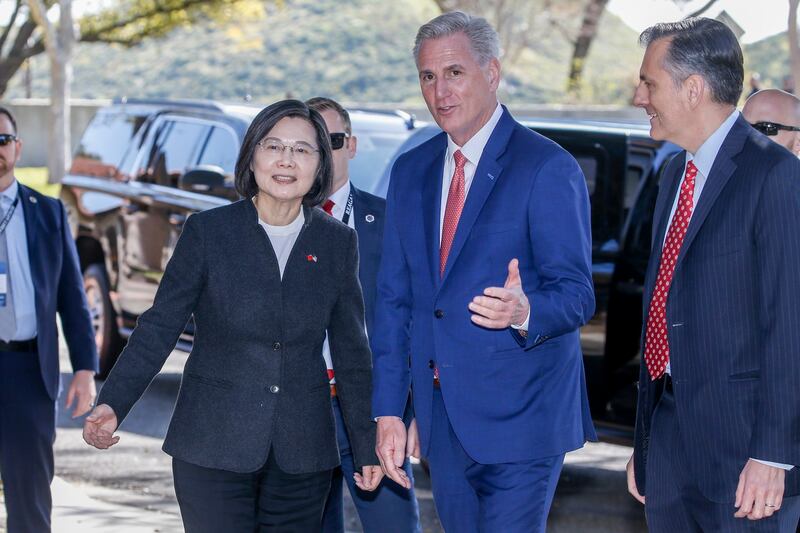UPDATED AT 06:30 a.m. ET on 2023-04-07
Beijing on Friday announced further sanctions against the Taiwanese de facto ambassador to the United States following the meeting between Taiwan’s president and the U.S. House speaker, China’s Taiwan Affairs Office said.
New “punishments” with immediate effect have also been imposed against two organizations, the Taiwan Prospect Foundation and the Council of Asian Liberals and Democrats.
China also announced sanctions on U.S.-based Hudson Institute, Ronald Reagan Presidential Library, and their four senior officials.
Bi-khim Hsiao, Head of the Taipei Economic and Cultural Representative Office in the U.S., as well as her family members, will be "strictly" banned from entering the mainland, Hong Kong and Macau, a spokesperson for China's Taiwan Affairs Office said.
Hsiao’s financial sponsors and related businesses will also be banned from “cooperating with mainland organizations and individuals.”
“All other necessary punitive measures will be taken to ensure lifelong accountability according to law,” the spokesperson warned.
Hsiao, who is being labeled "a diehard Taiwan independence separatist" by Beijing, responded on Twitter: "Wow, the PRC just sanctioned me again, for the second time," referring to China by its official name the People's Republic of China.
Last August following a visit by then-U.S. House Speaker Nancy Pelosi to Taiwan, China imposed an entry ban on Pelosi and her immediate family members, as well as Hsiao and six other Taiwanese officials and lawmakers.
The measures are believed to have little impact as Hsiao does not travel to China and her family has no business interests in the mainland.
Taiwan’s foreign ministry reacted by saying the move “exposed the irrational and absurd nature of the communist regime.”
It described President Tsai’s visit as “a complete success,” and called sanctions an “overreaction to further suppress our country’s international space.”
‘Resolve, will and ability’
Similar sanctions were also imposed on two Taiwanese organizations – the Prospect Foundation and the Council of Asian Liberals and Democrats – for their involvement in promoting Taiwan independence “under the guise of academic and research exchanges."
"No individual or force should underestimate our strong resolve, will and ability to safeguard China's sovereignty and territorial integrity," the spokesperson of the mainland’s Taiwan Affairs Office said.
China lists Taiwan as one of its provinces but Chinese courts do not hold jurisdiction over the island.
In a statement, the Prospect Foundation said it regretted the Chinese move, saying it would “set up obstacles for China's communication with the outside world.”
It called on Beijing to reverse the move as soon as possible but added that the foundation would not change its principles of upholding “the spirit of academic independence and the principle of safeguarding Taiwan's sovereignty, conducting exchanges and cooperating with the outside world,” because of China's announcement.

The Chinese Foreign Ministry also imposed an entry ban on four senior executives of the Hudson Institute and the Ronald Reagan Presidential Library, which hosted Tsai Ing-wen during her recent stopovers in New York and California.
"Universities, institutions and other organizations and individuals in China are prohibited from conducting exchanges and cooperation with the two U.S. institutions," the ministry said in a statement.
On Thursday, Beijing vowed to take “strong and resolute measures” against Taiwan and a Chinese carrier group is currently operating in the waters east of the island.
The aircraft carrier Shandong is in the West Pacific for the first time – its regular operation area is the South China Sea. It is equipped with a large number of warplanes on the deck, including J-15 multirole fighters, Z-18 transport helicopters and at least one Z-9 reconnaissance helicopter.
The Chinese Foreign Ministry repeatedly condemned the meeting between Tsai Ing-wen and Kevin McCarthy, as well as the Taiwanese president’s stopovers in the U.S.
Beijing said Washington and Taipei have “crossed the line” and “seriously infringed upon China’s sovereignty and territorial integrity.”
Meanwhile, former Taiwanese president Ma Ying-jeou returned from a trip to China Friday, warning that the policies of Tsai Ing-wen’s government have escalated tensions with Beijing and the island will in future have “a choice between peace and war,” the Reuters news agency reported.
Ma is the first former president to visit China since 1949. His Kuomintang party hopes to regain the presidency in next January’s election on a campaign of increased cooperation with Beijing.
This story has been updated to include comments from Taiwan's foreign ministry and the Prospect Foundation.
Edited by Mike Firn.
